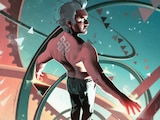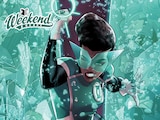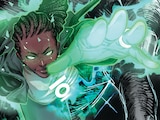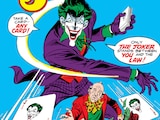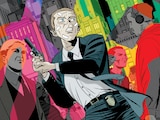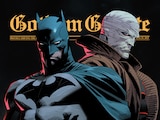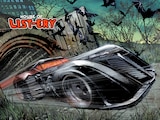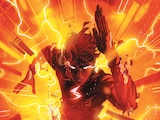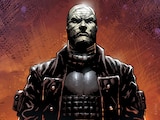In 2014, Bruno Heller and Danny Cannon teamed up to create the Batman prequel Gotham, building an entire world around the Dark Knight’s city as Bruce Wayne came of age. Five years later, Gotham has wrapped up, but Bruno and Danny aren’t done playing in Bruce Wayne’s universe. Pennyworth tells the story of Bruce’s beloved butler back when he was a young man in 1960’s London…with a few pretty major historical twists. (Hello, warring secret societies!)
Like Gotham, Pennyworth also plays things a bit fast and loose with the Bat-mythos, in this case reimagining Bruce’s father Thomas Wayne as an agent who gets caught up in a sinister covert plot. Where did this surreal, sexy and kinda scary vision of England come from? How did they cast the perfect young Alfred? And was there anything they learned from Gotham that made its way to Pennyworth?
We recently caught up with Bruno Heller and Danny Cannon, who gave us some insight on all of this and more.
Note: The following interview has been edited for clarity

Creating the World of Pennyworth
Danny Cannon: You don't know until you're writing a scene, or until you're directing a scene or until you see somebody actually performing a scene, what your influences have been. I've read so much “nerd stuff.” I grew up with that stuff. I've watched everything. You don't realize what you've been inspired by until you actually see it. There might be a comic book image that you've one day and you're like, “Oh my God. Now I remember that frame, but I didn't know until that moment.” It's nice when that happens.
Bruno Heller: Batman stories are very specific because everyone knows what the outcome is. The question for me was, how does someone who was a brave man of action and a soldier become a butler? That's a strange journey. Answering that question formed the essence of how to portray his journey. Then it was really taking all those brilliant Alfreds that have been portrayed in the past and creating a convincing version of that as a young man. Jack Bannon does an amazing job. He's both cool and vulnerable, he's not macho but you can see that he can care of himself. You can see the intelligence and you can see the heart.
DC: There are lots of characters we could have considered, but Pennyworth was somebody who had zero backstory. Many times, he's been portrayed as this stiff kind of butler. It was really Michael Caine, when he worked on those movies, who gave him a military background. That made total sense to me, because this was a guy who was eventually going to mentor Bruce Wayne, and we did that in Gotham— the idea that he's not just mentoring him into a man and giving him advice, he's physically helping the guy.

This is a guy with a lot of experience, so we wanted to go back and ask where did that experience and that maturity come from? And why would somebody at the very beginning of the story go, “I'll never be a butler, Dad, forget that,” when we know he will? What's going to happen to this guy? What journey will he go on to fulfill that destiny and why? That got us talking.
For the first time ever, we could create a DC-style 1960s England. I was worried at the beginning that we wouldn't know who the villains would be, but when you mine British history and you decide you’re going to alter British history because this is an alternative DC reality, it's very close. It's only 13 degrees off. What happened to Jack the Ripper's family? What happened to Myra Hindley? When you start to realize that Guy Fawkes and all of these mythological characters and characters from British history are available to us, then you go, “Wow, that's an interesting bunch of villains.”

Creating Alfred’s Friends and Foes
BH: For Bet Sykes, the basis of it is a very common archetype in English culture, which is a sort of strong no-nonsense Northern woman. A Manchester woman. It might be obscure to an American audience, but Elsie Tanner out of Coronation Street or Myra Hindley, who was a famous serial killer of the 1960s. There's a little bit of Dusty Springfield in there.
That way of talking that she has, which is very sort of no-nonsense direct and just naturally funny, is difficult. You can either do that or you can't. And Paloma, who is a Northerner, a Londoner like me, she just did it brilliantly. All the executives didn't know that she was a famous pop star, but all said, “She's the one.”
Paloma, and her sister who is played by Polly Walker, just make a wonderful bad female duo in a style and attitude that people haven't seen before. Once you see them doing stuff, they can do scenes where they don't say a word at all, they're just looking at people and it's funny and scary and thrilling.

DC: Bruno really had a good take on the parents. We've spoken so much about why Alfred wouldn’t want to be a butler. His father had to be a butler. He had to be able to talk to him in a way and there's a great moment in episode 10, without giving too much away, where you see them together in butler attire, and it was really kind of a special moment because nothing says class system more like a butler. Not many people have butlers and butlers were working class men who spent their whole lives 24/7 assisting, helping and keeping the image of privileged families. We know that's what Alfred is going to end up doing, so watching him resist that as much as he can—but deep down it's in his DNA—I think we had a lot of fun with that.
BH: That's one of the advantages of taking the show so far back. People know that the Joker is not going to appear. It's a long game. We're slowly moving towards the iconic versions of the characters that we know and love. As soon as you bring Alfred's mom and dad into it, that immediately suggests storylines of emotional interest that you just can't do with him as this elderly alone guy.
It was very important to us to do a show that would appeal beyond the Batman audience. Not just for demographic reasons, but because I believe that the DC Universe is kind of infinitely expandable. That's the beauty of myth. The more you can expand it into the real world, the better. The Batman fans are grown up and they have to have some kind of different shtick.

Finding the Cast
BH: We didn't have people in mind because from a practical point of view, the whole explosion of TV in the last few years means that there's a real shortage in the market of actors. If you decide that you want so-and-so, you're going to find they're doing a six-year role in something else. It's much more about people coming into the room and doing it right.
With Jack for instance, he had a little test piece of dialogue. There was a lot of name-actors who went up for it, but basically 90 percent of them did the scene with menace. Jack was the only one who sort of sat back and did it with charm and understated threat, which is exactly what we want. With TV, you can't get people to pretend to be something they're not. You need someone who's going to be that person just naturally, and that's what Jack brought to it. Same thing with Ben playing Thomas. He has that sort of contrition and suave cultivated air about him that creates that kind of 1950s-style American who spoke in a slightly English accent and carried themselves with a sort of good manners.
They brought such natural energy to it that as soon as we saw it, I said, “Alright, I'll write to that.” It's much more fun to write to the people that you get, then to impose a character on them.

The Tone of Pennyworth
DC: When I went back and looked at old films and old photographs, ironically England wants to be cold blue and gray constantly but you have to fight that. They were using a film stock called aqua back in the day—all that old Kodak stock. When I went back and looked at that, so much of it is tinted towards trying to cheer England up. I wanted to do a lot of fireplaces. So, the warm glow of England and the tobacco-colored stained walls and the cigar smoking—that world I was very interested in and all of my reference material was that. Gotham was much more comic book in that the images had to be impactful and it was action and it was very immediate. This I could slow down. One of the influences is The Crown, because it had that 1950s period done very well. It was calm and it took its time and it was patient. It was actually easier to shoot because I shot a lot less, a lot wider and let the frames contain themselves like paintings.
Their Version of 1960’s London
DC: The arching story this season is about a civil war that's brewing. That came from a conversation with myself and Bruno where we were considering doing V for Vendetta. That's very much an ’80s or ’90s kind of show…what would it be in the ’60s? What kind of world would we have to create?
Like in Gotham, there will eventually be Batman and in this there will eventually be V for Vendetta. So, we took this brewing civil war as a stepping stone. England is just fresh out of a war, looking to get into another war. We don't know what deals it's made with other countries because the Second World War ended differently. It's about espionage, it's almost like Funeral in Berlin or all those Cold War dramas. Michael Caine films became our influences.

Lessons Learned from Gotham
DC: I think when we were proudest of Gotham was when we treated it as a show that stood by itself and we stopped adhering to what comic books have done before. I always used to say it's like you're covering a song by the Beatles—you're not doing it exactly like them. You've got to give the singer a good opportunity to perform that song the way they want to perform it. The minute we gave ourselves that freedom on Gotham, that helped us.
With this now, we just said it's our take on this or bust and if people don't like it, it's cool. You've got to just be proud of it no matter what. I just think that the DC canon is this beautiful church to go pray in, but it doesn't want to be completely simulated every time. You need to go run with that.
BH: That's always a challenge with the Batman world. The challenge is not to be scared and you have to stay off social media. That's the thing with the world, there will be people who like and people who hate it with a passion. We have to just jump off the cliff and let gravity take over.
The more subtle the Easter eggs are, the better. Easter eggs should not be comprehensible to people who don't care about the world. So, the Easter eggs that we will have in this show are ones that only people who are really deep into the world will understand, as opposed to the more obvious winks. I don't think we should wink at these things. You have to take the work seriously, but at the same time be playful inside it.
Pennyworth airs Sundays at 9 p.m. (8 p.m. CST) on EPIX, and you can also watch on the EPIX NOW app.

